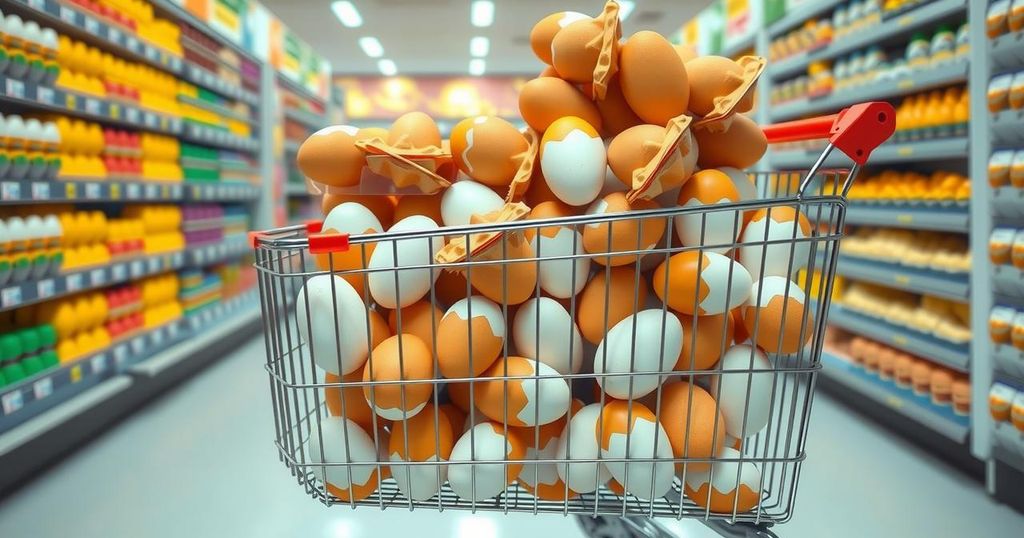World news
AMERICA, AMERICAN EGG BOARD, ASIA, BRAZIL, COST OF LIVING, DONALD TRUMP, ECONOMICS, GOVERNMENT SPENDING, INFLATION, JOE BIDEN, MEXICO, NORTH AMERICA, OVAL, OVAL OFFICE, PHILIPPINES, POLITICS, SOUTH AMERICA, SOUTH KOREA, TRUMP, TURKIYE, TÜRKIYE, UNITED STATES, US, US CONGRESS
Marcus Chen
0 Comments
The Egg Crisis: U.S. Imports, Rising Prices, and Australia’s Response
The egg crisis in the U.S. has led to soaring prices, driven by a significant bird flu epidemic. President Trump has responded by initiating imports from countries like South Korea, Türkiye, and Brazil. In Australia, similar challenges persist, but there are no plans to import eggs, as the government prioritizes biosecurity measures.
United States President Donald Trump has recently addressed the escalating cost of eggs in the country, attributing much of the price surge to policies under the Biden administration. Since last year, egg prices have soared by 65 percent, exacerbated by a predicted further increase of 41 percent by 2025. Consequently, the U.S. is now importing eggs from nations such as South Korea, Türkiye, and Brazil to alleviate this crisis, while reports indicate that people are resorting to smuggling eggs across the border from Mexico due to their lower prices.
The dramatic rise in egg prices can be traced back to a significant bird flu epidemic that has necessitated the culling of millions of chickens across America. Estimates suggest that approximately 170 million birds have already been killed, leading to an acute shortage and the resultant soaring prices. A dozen large grade A eggs averaged around $5.90 in February, with expectations that this may rise to $8.32 later in the year. Furthermore, allegations of market manipulation by larger suppliers have emerged, but these claims have been refuted by the American Egg Board.
In response to the egg shortage, the U.S. government has unveiled a $1.87 billion initiative to facilitate the importing of eggs from various foreign markets. U.S. Agriculture Secretary Brooke Rollins stated that the country intends to secure hundreds of millions of eggs in the short term. Moreover, discussions are ongoing with Polish and Lithuanian farmers to explore additional egg supplies. While the current import strategy remains in effect, officials indicate that domestic production will resume once poultry populations recover.
Noteworthy is that Brazil’s Animal Protein Association has reported increased exports to the U.S., following a regulatory change that allows Brazilian eggs to be used for human consumption. As a result, egg prices have reportedly declined by 53 percent since the announcement of the import plan; however, the FDA posits that this downturn is primarily due to reduced consumer demand and fewer bird flu outbreaks.
Australia is experiencing challenges similar to those in the U.S., with bird flu outbreaks impacting domestic supply alongside rising prices. State-level restrictions on egg-laying birds have contributed to local shortages, especially in Victoria, where farms continue to report outbreaks. Although supermarket purchasing limits are being enforced, the Australian government has stated that retailers should maintain access to eggs amidst these limitations.
Unlike the United States, there is currently no indication that Australia plans to import eggs to alleviate their own market conditions. The government has established strict biosecurity measures against avian influenza, alongside a funding initiative aimed at addressing global outbreak challenges. Australian authorities emphasize that while localized shortages exist, overall egg availability remains relatively secure, with options for food companies to seek import approvals if deemed necessary, based on demand.
In summary, the current egg crisis in the United States is primarily driven by a severe bird flu epidemic leading to significant production declines and soaring prices. Efforts to mitigate these impacts include substantial imports from various countries. While Australia faces its own egg supply challenges, it has not opted to import eggs, emphasizing strict biosecurity measures and maintaining overall market stability. The situation underscores the complexities of global food supply chains, influenced by health concerns and market dynamics.
Original Source: www.abc.net.au




Post Comment